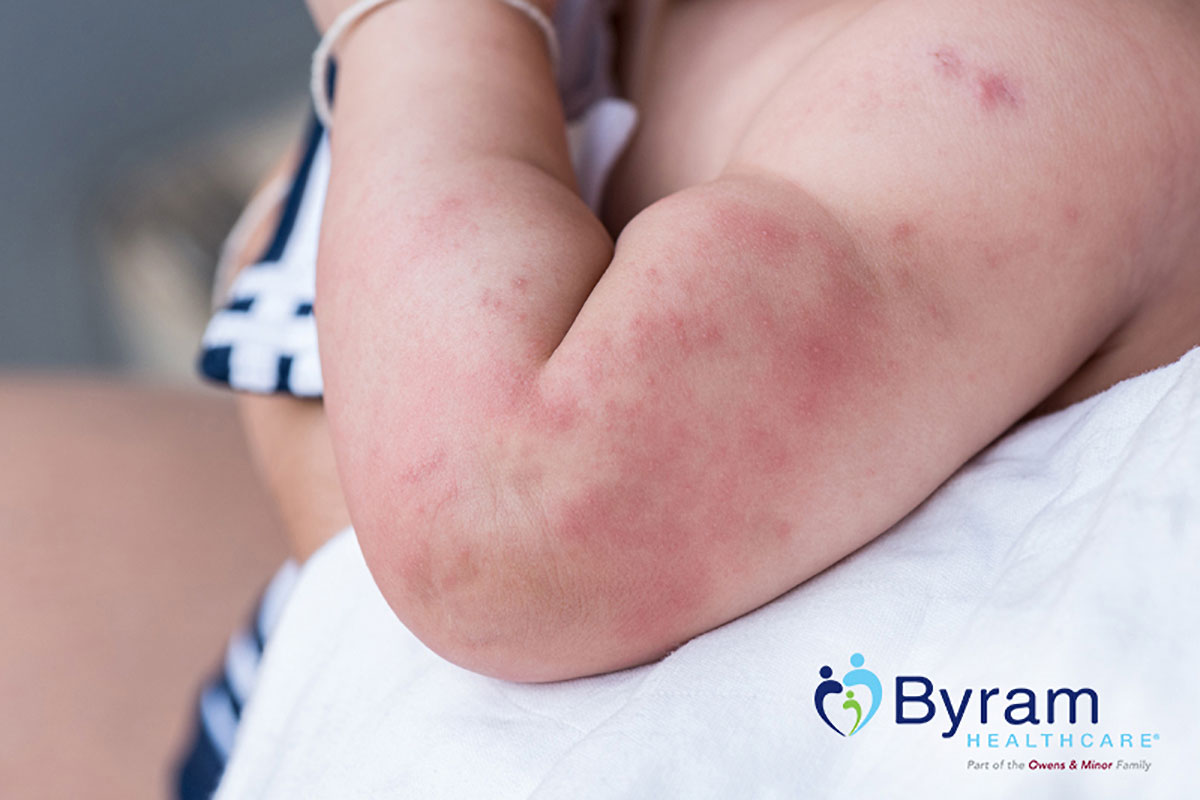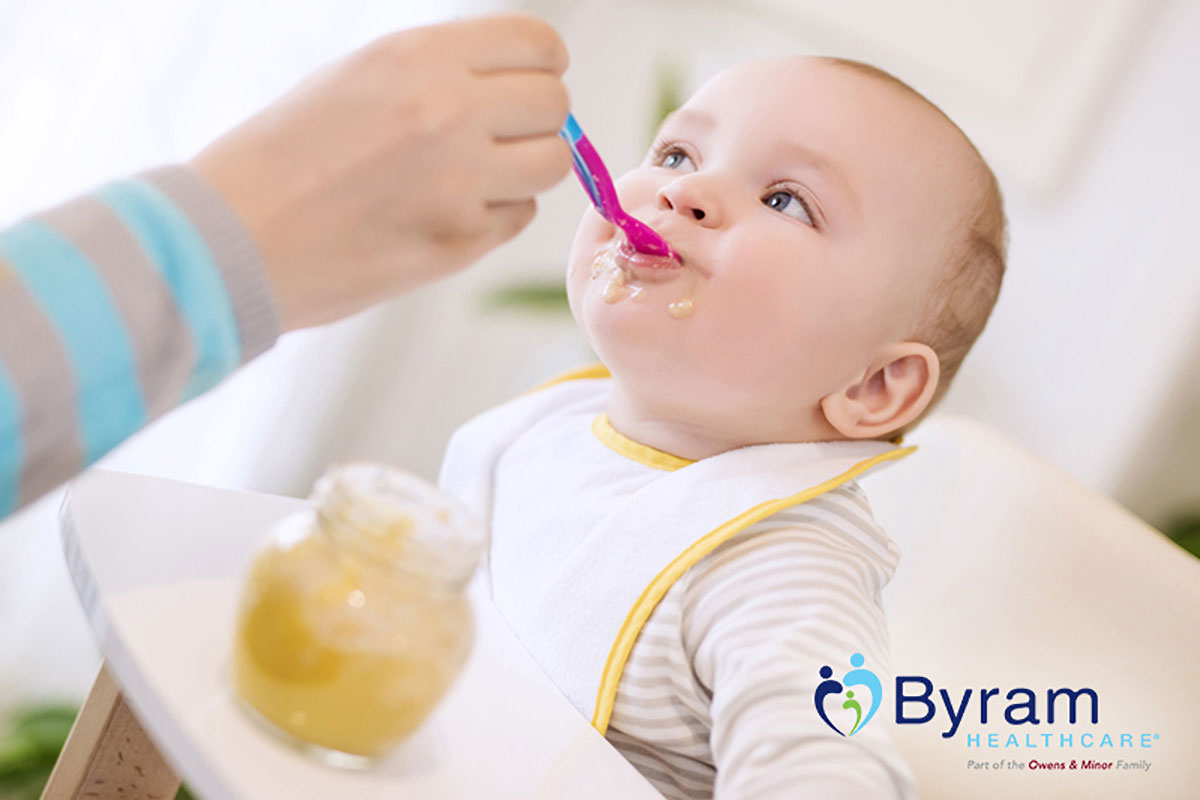When to Test Your Newborn for Food Allergies
A lot of parents get excited when they start to feed their child solid foods. It will be fun, adventurous and all around hysterical. You’ve seen the viral videos of babies eating lemons that make us all bend over laughing. Or how about the kid that discovered bacon and experienced his first love?
The point is… introducing solids is fun.
But when will you know when the time is right?
The American Academy of Pediatrics says that between the ages of 4 and 6 months is the optimal time to begin introducing solid foods. This is when babies start showing signs of readiness, which means that their bodies are ready. Some of these signs include sitting up with support, having control of their head and neck movements, showing interest in what you’re eating and no longer having the reflex of pushing food out of his or her mouth.
It’s important to start incorporating solid foods at this time because otherwise, your baby will get overly accustomed to liquids and loose the interest of learning how to eat solids.
When it’s time to start introducing solid foods, it means it’s also time to start testing your newborn for food allergies. The two go hand-in-hand. However, you’re introducing new foods, continue to breastfeed for other meals. This will help reduce the chances of food allergies due to the immune properties in the breast milk.
Common Allergenic Foods
Before you begin testing your newborn for allergies, here is a list of the most common allergenic foods. It’s great to keep this in mind when you start feeding your baby solids in order to keep a watchful eye out for any symptoms. Read more information on these common food allergens here.
- Milk
- Eggs
- Peanuts
- Tree nuts
- Fish
- Shellfish
- Soy
- Wheat
How to Test Your Newborn
While the time may have come to start testing your newborn, there’s a lot of conflicting information on how to actually do it. Luckily, we’ve put together our best tips for seamlessly testing your newborn below.
Introduce Solid Foods Gradually
Feeding your baby solids is fun. You get to see their reactions to certain foods and find out what they like and dislike. It’s one more milestone for parents to check off their lists. However, introducing solids should be done carefully.
When you do decide to start introducing solid foods to your newborn, make sure that you take your time. While it is tempting to let your child try a little bit of this and a little bit of that, it has the potential to cause complications. This is because introducing solids is essentially how you test for allergens.
For this reason, doctors recommend introducing babies to new foods one at a time. This way, if an allergic reaction does occur, you’ll be able to exactly pinpoint which food it was that caused the reaction.
If you give your child a few new solid foods over the course of the day and something goes wrong, you won’t be able to determine exactly which of the foods caused it and you’ll need to do further tests to be sure.
Don’t stress too much about the order of foods you introduce. As long as the foods are healthy, then things will go fine. As a general rule of thumb, the Mayo Clinic recommends single-ingredient foods with no added sugar or salt.
Additionally, it is recommended that every time you introduce a new food, you wait a few days before introducing more1. This is because some foods may have an extended reaction time. Which leads us to our next point…
Keep a Close Eye Out for Baby Food Allergy Symptoms
As you start introducing new foods, it’s important to make sure that you are keeping a close eye out for symptoms of allergies. Most reactions occur soon (even immediately) after the food is eaten, but will also extend hours post consumption.
Make sure that you are aware of the following food allergen symptoms so that you will react quickly.

- Hives or welts, which can occur on the face or on the body
- Rash or flushed skin
- Any swelling of the face, tongue or lips
- Vomiting
- Diarrhea
- Coughing or continual wheezing
- Any difficulty breathing
- A sudden loss of consciousness
In order to ensure the safety of your child, make sure that you pay close attention to these symptoms.
Severe Reactions
If your baby is having any difficulty breathing, high levels of swelling or severe vomiting and/or diarrhea, call 911 immediately. It is more important to get immediate medical attention than it is to contact your pediatrician first.
These types of symptoms indicate that your child is having a severe allergic reaction and you should take extra precaution to make sure that your child avoids these as they continue to grow.
Mild Reactions
A rash isn’t as serious as difficulty breathing, so don’t freak out! If mild allergic reactions occur simply give your pediatrician a call. They will walk you through the steps for how to manage these reactions.
If you find a mild reaction in a food, it’s best to completely avoid it for now. Allergens will increase in severity over time, remain the same or completely disappear. Talk to your pediatrician for more information
Only Introduce New Foods at Home
After reading about the symptoms, we’re sure you understand why we recommend only introducing new foods at home. This makes things much more manageable if an allergic reaction occurs.
Plus, who wants to deal with the stress of baby’s first allergic reaction while out at a restaurant? We doubt many people do.
If you want to be especially careful, consider having a child-safe oral antihistamine around. Talk to your pediatrician to find one that will work best for you and your child.
Be Especially Careful When Introducing Peanut Products
Serious food allergies are dangerous and will change the way you and your family eat. Since the most common serious allergen is peanuts, be overly cautious when introducing it to your child.
This doesn’t mean hold off on introducing peanuts though. In fact, there’s currently research that states that introducing younger children to peanuts, as early as 4 months old, can actually reduce the risk of developing an allergy.
Here’s a great article with tips for safely incorporating peanuts into your baby’s diet.
See an Allergist
When you are allergic to something, your body develops antibodies as a layer of protection. When these antibodies come in contact with the allergen, there are chemicals released to warn your body. These chemicals are what cause food allergy symptoms.
If you find that your baby has one or more positive symptoms of allergic reactions, it’s a good idea to take them into an allergist. At their office, an allergist may recommend either doing a blood test, a skin prick test or both.
A blood test measures the amount of antibodies that your body contains for specific allergens6. A skin test is an alternative way to test allergens but will cause more discomfort for newborns over a longer period of time.
Take Precautions
There are a few precautions to keep in mind when you begin testing your newborn for allergies. The following things are not appropriate for babies and should be avoided until the reach a certain age:
- No cow’s milk before reaching age 1.
- Do not give your infant honey – it causes a serious illness called infant botulism. Wait until at least 1 year, maybe even 2 years to be on the safe side.
- Always cut up the food your giving your newborn into small pieces that have zero risk of choking.
- Avoid hard foods like nuts, popcorn and candy.
The Difference Between Intolerance and an Allergy
One thing to note is that there is a difference between an allergy to foods and intolerance to foods. An allergy is your immune system’s first line of defensive. It indicates that there is something, usually a protein, in the food that will cause either respiratory or gastrointestinal problems.
There may be an underlying factor causing the allergens, but that is easier to test when your baby grows older.
Intolerance to food is more of a metabolic response – unrelated to the immune system. It usually involves enzymes and chemical reactions that any given body has a hard time processing. Talk to your pediatrician to learn more about these differences and what they mean for your baby.
Conclusion
When your newborn begins to show signs of curiosity toward solid foods, it’s time to start testing them for allergies. Remember, start slow and always introduce new foods in a place that you’re comfortable in. If you have any genetic predispositions to allergies, be cautious and ready for reactions. It can be handy to keep a child-friendly antihistamine ready just in case, and remember to always call 911 before your pediatrician in case of severe reactions. If you’re looking for more great pregnancy tips, info, and product reviews head over to our website. As always, through the Affordable Care Act you are eligible to receive a breast pump from Byram Healthcare at no additional cost.
Have any fun stories or words of caution about when you introduced your baby to solids for the first time? Leave a comment on our Facebook page today!






